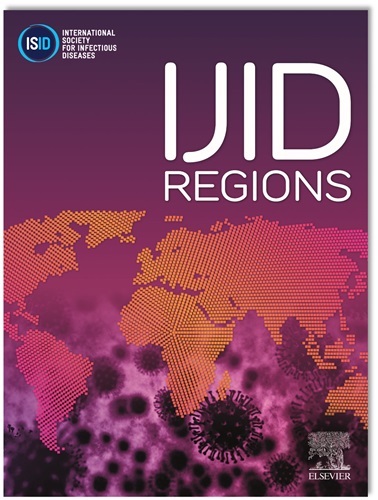Dengue fever in immunocompromised patients: A systematic review and meta-analysis
IF 4.8
2区 医学
Q1 INFECTIOUS DISEASES
引用次数: 0
Abstract
Objectives
Given the complex role of immunity in dengue severity, we aimed to review the clinical course of dengue infection in immunocompromised patients.
Methods
We conducted a systematic review of studies reporting outcomes among immunocompromised patients with laboratory-confirmed dengue infection. Meta-analysis using the Mantel-Haenszel method (fixed effects) was performed for studies with control groups. We registered the study with PROSPERO (No. CRD42021258930).
Results
We included 115 studies. Among these, 30 studies compared immunocompromised (cases) and nonimmunocompromised (control) patients, focusing mainly on children (n = 22 studies) with malnutrition (n=18). Immunocompromised patients had a higher likelihood of dengue complications (OR 1.87; 95% CI: 1.04-3.35]) but a lower likelihood of severe dengue (OR 0.83; 95% CI: 0.69-1.00]. No significant difference in mortality was observed. In the 85 studies focused solely on immunocompromised patients, severe dengue and mortality rates were 9% and 4%, respectively, mostly among adult solid organ transplant recipients and those with inflammatory diseases. Immunosuppressive treatment alterations and temporary graft dysfunction were reported.
Conclusion
Immunocompromised patients have an increased risk of dengue-related complications. However, definitive conclusions about the comparative severity of dengue across different immunocompromised patient groups are limited by a lack of robust data, highlighting the need for well-designed future studies.
免疫力低下患者的登革热:系统回顾与元分析》。
目的鉴于免疫力在登革热严重程度中的复杂作用,我们旨在回顾免疫力低下患者感染登革热的临床过程:我们对实验室确诊登革热感染的免疫功能低下患者的研究结果进行了系统回顾。采用曼特尔-海恩泽尔法(固定效应)对有对照组的研究进行了元分析。我们在 PROSPERO(编号:CRD42021258930)上注册了这项研究:结果:我们纳入了 115 项研究。其中,30 项研究对免疫力低下(病例)和非免疫力低下(对照)患者进行了比较,主要集中在营养不良的儿童(22 项研究)(18 项研究)。免疫力低下患者出现登革热并发症的可能性较高(OR 1.87;95% CI:1.04 - 3.35]),但出现严重登革热的可能性较低(OR 0.83;95% CI:0.69 - 1.00])。在死亡率方面没有观察到明显差异。在 85 项仅针对免疫力低下患者的研究中,重症登革热发病率和死亡率分别为 9% 和 4%,主要集中在成人实体器官移植受者和炎症性疾病患者中。免疫抑制治疗改变和暂时性移植物功能障碍也有报道:免疫力低下的患者发生登革热相关并发症的风险增加。然而,由于缺乏可靠的数据,关于登革热在不同免疫力低下患者群体中的严重程度比较的明确结论受到了限制,这凸显了今后进行精心设计的研究的必要性。
本文章由计算机程序翻译,如有差异,请以英文原文为准。
求助全文
约1分钟内获得全文
求助全文
来源期刊
CiteScore
18.90
自引率
2.40%
发文量
1020
审稿时长
30 days
期刊介绍:
International Journal of Infectious Diseases (IJID)
Publisher: International Society for Infectious Diseases
Publication Frequency: Monthly
Type: Peer-reviewed, Open Access
Scope:
Publishes original clinical and laboratory-based research.
Reports clinical trials, reviews, and some case reports.
Focuses on epidemiology, clinical diagnosis, treatment, and control of infectious diseases.
Emphasizes diseases common in under-resourced countries.

 求助内容:
求助内容: 应助结果提醒方式:
应助结果提醒方式:


